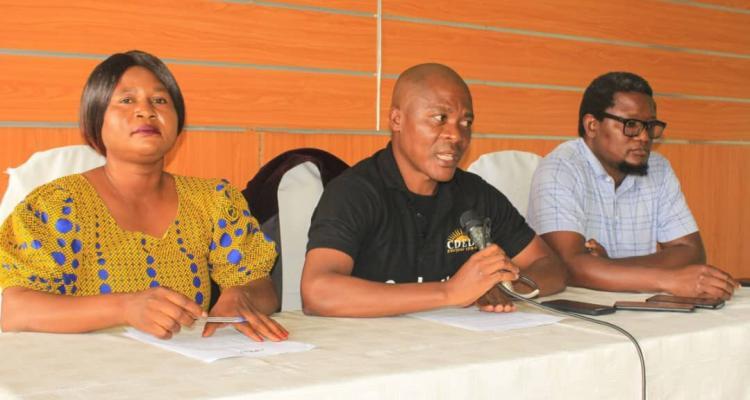
The Centre for Democracy and Economic Development Initiatives (CDEDI) has pleaded with the Minister of Homeland Security to suspend relocation of refugees and asylum seekers to Dzaleka Refugees Camp saying there are numerous issues surrounding the exercise that remain unresolved.
Speaking during a press briefing, CDEDI Executive Director, Sylvester Namiwa said that the calls are coming considering that the directive is lacking merit hence the responsible ministry ought to approach the matter with sobriety and ensure that measures it employs in the exercise do not boomerang on it.
Government through Minister of Homeland Security set 15 April, 2023 as the deadline for all the refugees and asylum seekers staying elsewhere in the country to relocate to Dzaleka Refugee Camp in Dowa.
According to CDEDI, the relocation smacks of selective justice as it seems applicable only to refugees and asylum seekers from Rwanda and Burundi while it is business as usual for other illegal migrants.
Namiwa said while government is acting within the realm of the laws and regulations governing refugees and asylum seekers, more has to be considered.
He has cited the issue of congestion at the camp as an example of the numerous pressing issues saying, for instance, the camp was designated to host 10,000 refugees but now is already hosting over 50,000 of them.
“Simply put, Dzaleka Refugee Camp is heavily congested and forcing more refugees will be a recipe for disaster and, to some extent, a violation of some rights of the refugees and asylum seekers,” he said.
Namiwa has also put to light glaring policy inconsistency given that the same government agitating for recampment, entered into an agreement with the United Nations High Commission for Refugees (UNHCR) and introduced what is called ‘self-reliant tokens’ to those that have proven to lead an independent life outside the camp.
This was an attempt to save the refugees and asylum seekers from starvation after it became apparent that both the Malawi Government and UNHCR could not provide adequate food at the camp. Till this hour, government is still issuing the self-reliant tokens.
In the year 2000, government opened up to refugees and asylum seekers that came in with skills and expertise beneficial to the society in areas of health, education and social work to go and live where they could put their skills and expertise to the benefit of the country.
“Most of those that took heed of the call have been peacefully living among Malawians for over 20 years and in the passage of time some have intermarried with Malawians. This scenario begs moral questions such as what would become of such marriages? How about the services rendered, let alone the movable and immovable assets accumulated throughout the decades of their stay in the communities,” wonders Namiwa.
He has since suggested that Malawi ought to learn from other countries in the region, particularly its neighbours how they are benefiting from integrating refugees and asylum seekers.
“Surely, it beats human understanding that as a country we should be pushing back to a congested camp—where living conditions are dire—people who, besides being self-reliant are significantly contributing to wealth and job-creation in the country,” he said.
He added that some refugees and asylum seekers outside the camp have established businesses that are positively contributing to the social and economic status of the country.
“Needless to remind all and sundry that such businesses owned by refugees and asylum seekers have provided means of livelihood to many locals in form of employment,” he highlights.
The CDEDI Executive Director has since reiterated its call for the Legal Affairs as well as the Defense and Security committees of Parliament to look into concerns raised in its June 1, 2021 petition, which proposed the review of the archaic 1989 Refugees Act.
Namiwa feels the review will help to ensure that some of the refugees and asylum seekers are integrated into society as, despite their status, they have proven to be critical to the social and economic development of our nation.
Authorities have been reminded that there is an ordeal behind every refugee and just like any human being, they have basic rights and freedoms that ought to be respected.
Follow us on Twitter:














